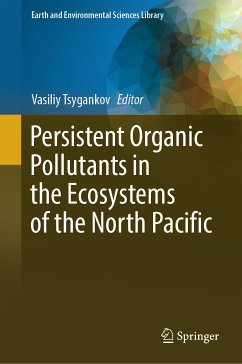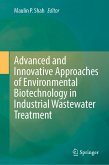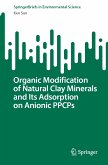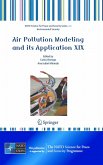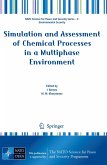Persistent Organic Pollutants in the Ecosystems of the North Pacific (eBook, PDF)
106,99 €
inkl. MwSt.
Sofort per Download lieferbar

0 °P sammeln
Persistent Organic Pollutants in the Ecosystems of the North Pacific (eBook, PDF)
- Format: PDF
- Merkliste
- Auf die Merkliste
- Bewerten Bewerten
- Teilen
- Produkt teilen
- Produkterinnerung
- Produkterinnerung

Bitte loggen Sie sich zunächst in Ihr Kundenkonto ein oder registrieren Sie sich bei
bücher.de, um das eBook-Abo tolino select nutzen zu können.
Hier können Sie sich einloggen
Hier können Sie sich einloggen
Sie sind bereits eingeloggt. Klicken Sie auf 2. tolino select Abo, um fortzufahren.

Bitte loggen Sie sich zunächst in Ihr Kundenkonto ein oder registrieren Sie sich bei bücher.de, um das eBook-Abo tolino select nutzen zu können.
The book reports the results on the fate of POPs in the abiotic and biotic components of the aquatic environment North Pacific Ocean (include Russian part of North Pacific), possible health risks for coastal residents Pacific Ocean exposed to these hazardous pollutants are systematized. In particular, indicator organisms (fish, birds, and mammals), indicating the pollution of the region, were identified; the possible ways of xenobiotic transfer from the sea to the land are shown; the targets of POPs impact on living organisms were determined; the time of circulation of pollutants in the…mehr
- Geräte: PC
- ohne Kopierschutz
- eBook Hilfe
- Größe: 8.23MB
- Upload möglich
Andere Kunden interessierten sich auch für
![Climate Changes Impacts on Aquatic Environment (eBook, PDF) Climate Changes Impacts on Aquatic Environment (eBook, PDF)]() Climate Changes Impacts on Aquatic Environment (eBook, PDF)121,95 €
Climate Changes Impacts on Aquatic Environment (eBook, PDF)121,95 €![Advanced and Innovative Approaches of Environmental Biotechnology in Industrial Wastewater Treatment (eBook, PDF) Advanced and Innovative Approaches of Environmental Biotechnology in Industrial Wastewater Treatment (eBook, PDF)]() Advanced and Innovative Approaches of Environmental Biotechnology in Industrial Wastewater Treatment (eBook, PDF)213,99 €
Advanced and Innovative Approaches of Environmental Biotechnology in Industrial Wastewater Treatment (eBook, PDF)213,99 €![Organic Modification of Natural Clay Minerals and Its Adsorption on Anionic PPCPs (eBook, PDF) Organic Modification of Natural Clay Minerals and Its Adsorption on Anionic PPCPs (eBook, PDF)]() Ken SunOrganic Modification of Natural Clay Minerals and Its Adsorption on Anionic PPCPs (eBook, PDF)48,14 €
Ken SunOrganic Modification of Natural Clay Minerals and Its Adsorption on Anionic PPCPs (eBook, PDF)48,14 €![Air Pollution Modeling and Its Application XIX (eBook, PDF) Air Pollution Modeling and Its Application XIX (eBook, PDF)]() Air Pollution Modeling and Its Application XIX (eBook, PDF)73,95 €
Air Pollution Modeling and Its Application XIX (eBook, PDF)73,95 €![Acoustics-A Textbook for Engineers and Physicists (eBook, PDF) Acoustics-A Textbook for Engineers and Physicists (eBook, PDF)]() Jerry H. GinsbergAcoustics-A Textbook for Engineers and Physicists (eBook, PDF)69,95 €
Jerry H. GinsbergAcoustics-A Textbook for Engineers and Physicists (eBook, PDF)69,95 €![Acoustics-A Textbook for Engineers and Physicists (eBook, PDF) Acoustics-A Textbook for Engineers and Physicists (eBook, PDF)]() Jerry H. GinsbergAcoustics-A Textbook for Engineers and Physicists (eBook, PDF)69,95 €
Jerry H. GinsbergAcoustics-A Textbook for Engineers and Physicists (eBook, PDF)69,95 €![Simulation and Assessment of Chemical Processes in a Multiphase Environment (eBook, PDF) Simulation and Assessment of Chemical Processes in a Multiphase Environment (eBook, PDF)]() Simulation and Assessment of Chemical Processes in a Multiphase Environment (eBook, PDF)233,95 €
Simulation and Assessment of Chemical Processes in a Multiphase Environment (eBook, PDF)233,95 €-
-
-
The book reports the results on the fate of POPs in the abiotic and biotic components of the aquatic environment North Pacific Ocean (include Russian part of North Pacific), possible health risks for coastal residents Pacific Ocean exposed to these hazardous pollutants are systematized. In particular, indicator organisms (fish, birds, and mammals), indicating the pollution of the region, were identified; the possible ways of xenobiotic transfer from the sea to the land are shown; the targets of POPs impact on living organisms were determined; the time of circulation of pollutants in the biosphere was determined; a list of “priority” toxicants for the region based on quality screening was compiled; the risks to human health from the consumption of contaminated aquatic organisms were assessed; the levels of POPs in the human body were measured.
The book is interesting for specialists in the agro-industrial complex, aquaculture and medicine, teachers and graduate students of universities, researchers, which interested in the problems of persistent organic pollutants (POPs).
There are no similar books on the study of POPs in the Russian part of the Pacific Ocean in the world literature. This book is useful to scientists of the world who study the fate of POPs.
The book is interesting for specialists in the agro-industrial complex, aquaculture and medicine, teachers and graduate students of universities, researchers, which interested in the problems of persistent organic pollutants (POPs).
There are no similar books on the study of POPs in the Russian part of the Pacific Ocean in the world literature. This book is useful to scientists of the world who study the fate of POPs.
Produktdetails
- Produktdetails
- Verlag: Springer Nature Switzerland
- Seitenzahl: 352
- Erscheinungstermin: 30. Oktober 2023
- Englisch
- ISBN-13: 9783031448966
- Artikelnr.: 69246537
- Verlag: Springer Nature Switzerland
- Seitenzahl: 352
- Erscheinungstermin: 30. Oktober 2023
- Englisch
- ISBN-13: 9783031448966
- Artikelnr.: 69246537
- Herstellerkennzeichnung Die Herstellerinformationen sind derzeit nicht verfügbar.
Professor Vasiliy Tsygankov graduated from the School of Natural Sciences of the Far Eastern Federal University (FEFU) (Vladivostok, Russia) in 2007, is Dean of the Industrial Biotechnology and Bioengineering Faculty of School of the Advanced Engineering Studies "Institute of Biotechnology, Bioengineering and Food Systems" at FEFU, is Professor and Head of the Laboratory of Chromatographic and Optical Methods of Analysis at FEFU, and is Doctor of Biological Sciences. Professor Vasiliy Tsygankov's area of scientific interests is fate of persistent organic pollutants and toxic elements in different components of the marine and terrestrial environment. Professor Vasiliy Tsygankov applied research in marine geochemistry, ecotoxicology, environmental chemistry, food safety, and control. Professor Vasiliy Tsygankov is Author and Co-author of more than 150 scientific publications.
The Dirty Dozen of the Stockholm Convention and Other Persistent Organic Pollutants: A Review.- Methods to Determine Persistent Organic Pollutants in Various Components of Ecosystems in the Far Eastern Region.- Methods for Determining Total Hydrocarbons and Polycyclic Aromatic Hydrocarbons in Various Components of Ecosystems of the Far Eastern Region.- Current Levels of Organochlorine Pesticides in Abiotic Components of Ecosystems in the Sea of Japan Basin and Khanka Lake.- Implementation of the Mussel Watch Program by Russian Scientists in the North Pacific (2000–2021).- Polycyclic Aromatic Hydrocarbons in Bottom Sediments and Fish from the Northwestern Pacific.- Concentrations of Persistent Organic Pollutants in Benthic and Pelagic Fish from the Fishery Zones in the Far Eastern Seas of Russia.- Biotransport of Persistent Organic Pollutants and Heavy Metals by Pacific Salmon in the Northwestern Pacific Ocean.- Organochlorine Pesticides and Polychlorinated Biphenyls in Fish from Lake Khanka, Sea Okhotsk Basin.- Semi-Aquatic Migratory Birds in the System of Persistent Organic Pollutant Monitoring (Exemplified by Avifauna of Lake Khanka, Sea of Okhotsk Basin).- Organochlorine Pesticides in Seabirds and Marine Mammals from the Sea of Okhotsk and Bering Sea.- Biotransformation of Persistent Organic Pollutants in Ecosystems of the Russian North Pacific.- Environmental Risks from Persistent Organic Pollutants in Marine Organisms of the Northwestern Pacific Ocean.- Non-Target Screening Analysis of “New” Persistent Organic Pollutants in the Far Eastern Seas.- Persistent Organic Pollutants in the Human Body: The Experience of Russia and the Former Soviet Republics.- Comparison of POP Accumulation between Human Organs, Tissues, and Organ Systems with Focus on Sex-Related Differences: First Investigations in Russia.- Persistent Organic Pollutants in Residents of Coastal Areas in the Russian FarEast.
The Dirty Dozen of the Stockholm Convention and Other Persistent Organic Pollutants: A Review.- Methods to Determine Persistent Organic Pollutants in Various Components of Ecosystems in the Far Eastern Region.- Methods for Determining Total Hydrocarbons and Polycyclic Aromatic Hydrocarbons in Various Components of Ecosystems of the Far Eastern Region.- Current Levels of Organochlorine Pesticides in Abiotic Components of Ecosystems in the Sea of Japan Basin and Khanka Lake.- Implementation of the Mussel Watch Program by Russian Scientists in the North Pacific (2000-2021).- Polycyclic Aromatic Hydrocarbons in Bottom Sediments and Fish from the Northwestern Pacific.- Concentrations of Persistent Organic Pollutants in Benthic and Pelagic Fish from the Fishery Zones in the Far Eastern Seas of Russia.- Biotransport of Persistent Organic Pollutants and Heavy Metals by Pacific Salmon in the Northwestern Pacific Ocean.- Organochlorine Pesticides and Polychlorinated Biphenyls in Fish from Lake Khanka, Sea Okhotsk Basin.- Semi-Aquatic Migratory Birds in the System of Persistent Organic Pollutant Monitoring (Exemplified by Avifauna of Lake Khanka, Sea of Okhotsk Basin).- Organochlorine Pesticides in Seabirds and Marine Mammals from the Sea of Okhotsk and Bering Sea.- Biotransformation of Persistent Organic Pollutants in Ecosystems of the Russian North Pacific.- Environmental Risks from Persistent Organic Pollutants in Marine Organisms of the Northwestern Pacific Ocean.- Non-Target Screening Analysis of "New" Persistent Organic Pollutants in the Far Eastern Seas.- Persistent Organic Pollutants in the Human Body: The Experience of Russia and the Former Soviet Republics.- Comparison of POP Accumulation between Human Organs, Tissues, and Organ Systems with Focus on Sex-Related Differences: First Investigations in Russia.- Persistent Organic Pollutants in Residents of Coastal Areas in the Russian Far East.
The Dirty Dozen of the Stockholm Convention and Other Persistent Organic Pollutants: A Review.- Methods to Determine Persistent Organic Pollutants in Various Components of Ecosystems in the Far Eastern Region.- Methods for Determining Total Hydrocarbons and Polycyclic Aromatic Hydrocarbons in Various Components of Ecosystems of the Far Eastern Region.- Current Levels of Organochlorine Pesticides in Abiotic Components of Ecosystems in the Sea of Japan Basin and Khanka Lake.- Implementation of the Mussel Watch Program by Russian Scientists in the North Pacific (2000–2021).- Polycyclic Aromatic Hydrocarbons in Bottom Sediments and Fish from the Northwestern Pacific.- Concentrations of Persistent Organic Pollutants in Benthic and Pelagic Fish from the Fishery Zones in the Far Eastern Seas of Russia.- Biotransport of Persistent Organic Pollutants and Heavy Metals by Pacific Salmon in the Northwestern Pacific Ocean.- Organochlorine Pesticides and Polychlorinated Biphenyls in Fish from Lake Khanka, Sea Okhotsk Basin.- Semi-Aquatic Migratory Birds in the System of Persistent Organic Pollutant Monitoring (Exemplified by Avifauna of Lake Khanka, Sea of Okhotsk Basin).- Organochlorine Pesticides in Seabirds and Marine Mammals from the Sea of Okhotsk and Bering Sea.- Biotransformation of Persistent Organic Pollutants in Ecosystems of the Russian North Pacific.- Environmental Risks from Persistent Organic Pollutants in Marine Organisms of the Northwestern Pacific Ocean.- Non-Target Screening Analysis of “New” Persistent Organic Pollutants in the Far Eastern Seas.- Persistent Organic Pollutants in the Human Body: The Experience of Russia and the Former Soviet Republics.- Comparison of POP Accumulation between Human Organs, Tissues, and Organ Systems with Focus on Sex-Related Differences: First Investigations in Russia.- Persistent Organic Pollutants in Residents of Coastal Areas in the Russian FarEast.
The Dirty Dozen of the Stockholm Convention and Other Persistent Organic Pollutants: A Review.- Methods to Determine Persistent Organic Pollutants in Various Components of Ecosystems in the Far Eastern Region.- Methods for Determining Total Hydrocarbons and Polycyclic Aromatic Hydrocarbons in Various Components of Ecosystems of the Far Eastern Region.- Current Levels of Organochlorine Pesticides in Abiotic Components of Ecosystems in the Sea of Japan Basin and Khanka Lake.- Implementation of the Mussel Watch Program by Russian Scientists in the North Pacific (2000-2021).- Polycyclic Aromatic Hydrocarbons in Bottom Sediments and Fish from the Northwestern Pacific.- Concentrations of Persistent Organic Pollutants in Benthic and Pelagic Fish from the Fishery Zones in the Far Eastern Seas of Russia.- Biotransport of Persistent Organic Pollutants and Heavy Metals by Pacific Salmon in the Northwestern Pacific Ocean.- Organochlorine Pesticides and Polychlorinated Biphenyls in Fish from Lake Khanka, Sea Okhotsk Basin.- Semi-Aquatic Migratory Birds in the System of Persistent Organic Pollutant Monitoring (Exemplified by Avifauna of Lake Khanka, Sea of Okhotsk Basin).- Organochlorine Pesticides in Seabirds and Marine Mammals from the Sea of Okhotsk and Bering Sea.- Biotransformation of Persistent Organic Pollutants in Ecosystems of the Russian North Pacific.- Environmental Risks from Persistent Organic Pollutants in Marine Organisms of the Northwestern Pacific Ocean.- Non-Target Screening Analysis of "New" Persistent Organic Pollutants in the Far Eastern Seas.- Persistent Organic Pollutants in the Human Body: The Experience of Russia and the Former Soviet Republics.- Comparison of POP Accumulation between Human Organs, Tissues, and Organ Systems with Focus on Sex-Related Differences: First Investigations in Russia.- Persistent Organic Pollutants in Residents of Coastal Areas in the Russian Far East.
